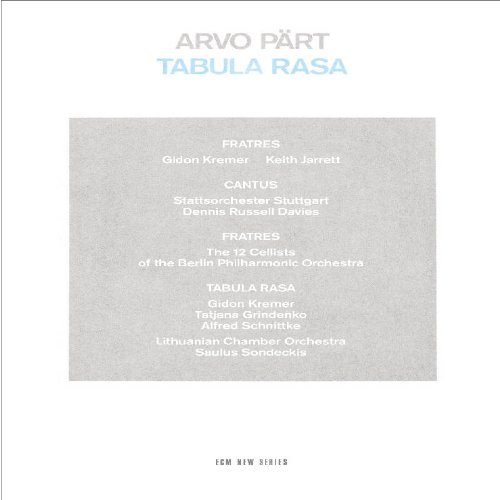Pärt Tabula Rasa
View record and artist detailsRecord and Artist Details
Composer or Director: Arvo Pärt
Label: ECM New Series
Magazine Review Date: 1/2011
Media Format: CD or Download
Media Runtime: 0
Mastering:
DDD
Catalogue Number: ECM1275

Tracks:
| Composition | Artist Credit |
|---|---|
| Fratres |
Arvo Pärt, Composer
Arvo Pärt, Composer Gidon Kremer, Violin Keith Jarrett, Piano |
| Cantus in memory of Benjamin Britten |
Arvo Pärt, Composer
Arvo Pärt, Composer Dennis Russell Davies, Conductor Stuttgart State Orchestra |
| Tabula rasa |
Arvo Pärt, Composer
Alfred Schnittke, Prepared piano Arvo Pärt, Composer Gidon Kremer, Violin Lithuanian Chamber Orchestra Saulius Sondeckis, Conductor Tatjana Grindenko, Violin |
Author: Rob Cowan
The iconic blue, grey and white CD cover has now become a book cover, which, given the original album’s significance, is hardly surprising. Back in 1984 Tabula rasa (blank slate) helped re-educate our ears and throw open the doors of our musical sensibilities to spatial domains that had otherwise been closed to us. Pärt’s near-minimalist “tintinnabulation” (a bell-like style based on a simple triad), his impeccable ear, sense of musical timing and deep spiritual engagement helped alter the way we listened in the late 20th century, cleansed us – or some of us – of the incessant need for musical “busyness”. Far from wearing off, the novelty of Pärt’s austerely meditative style has since become an essential component of our musical lives in the 21st century. If you’re a newcomer, then the weeping cadences of the Cantus in Memory of Benjamin Britten would be a good place to start, though the two very different versions of Fratres (brothers) will prove equally compelling, the violin option opening to fast, spidery arpeggios played solo by Gidon Kremer, before pianist Keith Jarrett calls a forceful halt and Kremer responds with tactile pizzicatos. The less openly demonstrative version for 12 cellos employs the same beautiful chords underpinned by a gentle, sporadic thudding. And there’s Tabula rasa itself, scored for prepared piano, two solo violins, string quartet and double bass, the seemingly timeless second movement “Silentium” opening to an infinitely strange rising sequence on the piano that sets off a haunting bass drone. Nothing else in 20th-century music is quite like it and while various later recordings have done the piece proud, this finely tensed version by Kremer and Tatjana Grindenko with Alfred Schnittke at the piano and the Lithuanian Chamber Orchestra under Saulius Sondeckis is a very definite first choice. The book includes perceptively written contributions from Paul Griffiths and Wolfgang Sandner as well as a very instructive first-ever publication of facsimiles of the manuscripts for Tabula rasa and the Cantus, and beautifully printed study scores of all five works. Even if you think you can’t follow a score, do try, and not just once… start with Tabula rasa’s “Silentium”, where the piano’s very visible punctuation will keep you on course. This extremely handsome production is a worthy tribute to what is without any shadow of a doubt one of the great recordings of the last century.
Explore the world’s largest classical music catalogue on Apple Music Classical.
Included with an Apple Music subscription. Download now.

Gramophone Digital Club
- Digital Edition
- Digital Archive
- Reviews Database
- Events & Offers
From £9.20 / month
Subscribe
Gramophone Club
- Print Edition
- Digital Edition
- Digital Archive
- Reviews Database
- Events & Offers
From £11.45 / month
Subscribe
If you are a library, university or other organisation that would be interested in an institutional subscription to Gramophone please click here for further information.






